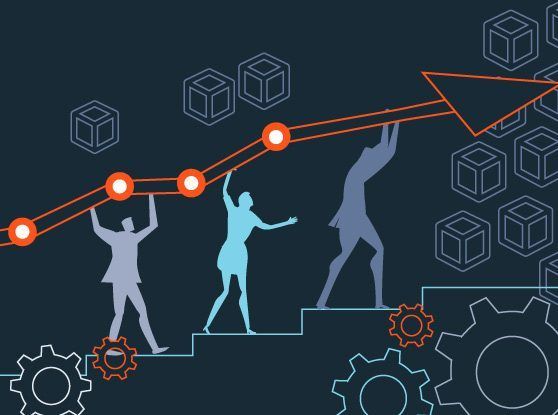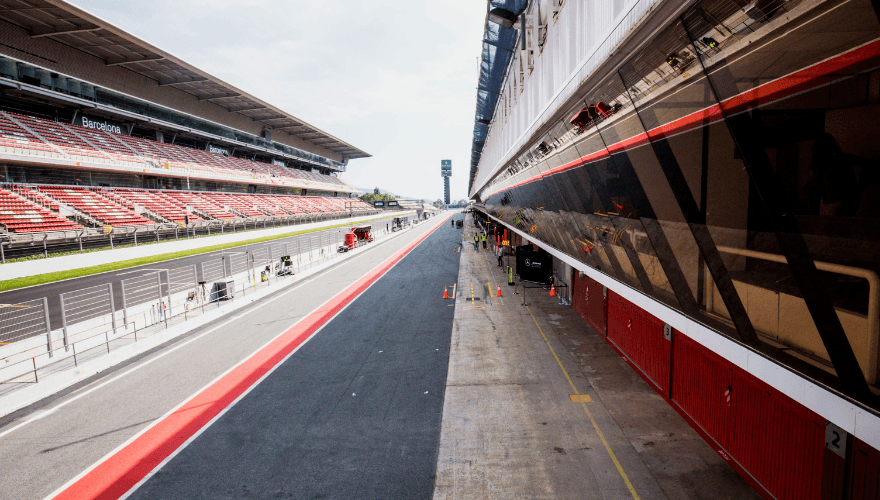
Insight’s IGNITE Innovation Roundtables provide C-level technology and digital leaders from large global companies the opportunity to learn, network with peers, and engage with emerging software market leaders.
In May 2018, the IGNITE team hosted 40 industry leaders for a weekend of idea exchange and networking against the backdrop of F1 Grand Prix in Monaco.

Robert Wolcott kicked off the day with a panel discussion about the future of Digital and issues about managing digital risk in the boardroom. He shared the stage with Board Directors from Ericsson, BBVA and Capio.
Keynote & Panel: Proximity in the Digital Age - The Future of All Business by Robert Wolcott, Clinical Professor of Innovation & Entrepreneurship, Kellogg School of Management at Northwestern University and Forbes Contributor.
- Panel: Sunir Kapoor, Board Director at BBVA
- Panel: Nora Denzel, Board Director at Ericsson
- Panel: Michael Wolf, former CEO at Swedbank
Wolcott believes that in the future we will need to push the production of products and services increasingly closer to the point of demand. A challenge is that while it’s nearly impossible to see the future, large global companies need to create a portfolio of options to be ready for the Digital age. As an example: the automotive industry will need to rethink metrics as unit sales cease to be as important. Wolcott also noted that “being a radio show on TV” will not work, and instead, we need to re-invent what we deliver to the customer.
The panel shared that the Board of Directors needs to align with leadership about the business case for choosing to invest, or not, in Digital. While the role of a Board Director is to advise, not execute, it’s critical for Board members to know the right questions to ask about Digital transformation. The panel also suggested that large global companies should contemplate setting up a technology advisory council to help provide counsel to the Board on these matters. The takeaway: the Board functions as the steward for the future of the business and therefore must be involved in the Digital strategy.
Keynote: Driving Digital Transformation Inside the Enterprise by Maria Grazia Pecorari, President, Digital, Global Services at BT
Maria Gazia Pecorari is formulating the Digital strategy at BT (formally, British Telecommunications) and helping drive the transformation of the business and its culture. Maria recommended reading “Why Strategies Fail” by McKinsey before embarking on the Digital journey. She spoke about changing demand patterns, the need to define business boundaries around a platform, and the need for the business simplification ahead of embarking on Digital transformation. After looking in the rearview mirror, Maria shared some essential points:
- Agility must be at the core of the transformation
- Getting back to basics is critical
- The customer must be at the centre
- Young and new talent can help accelerate Digital transformation
- Everyone must ask: “What’s in it for me?”
Maria concluded with the observation that a legacy culture can stand in the way of Digital transformation and cause organisations to move slowly. Global companies need to harness emotions much like a sports team would do before walking out onto the field – the team needs to be excited to win – this technique can materially affect the outcome of the Digital transformation.
Breakout Sessions: Removing the Cultural Barriers to Digital Transformation
Following Maria’s talk, participants met in discussion groups to share insights and best practices around breaking the cultural barriers to Digital transformation.

Some of the insights provided by the groups include:
- An Agile focus can serve as a catalyst to breaking cultural barriers through requiring business and technology leaders to come together rand collaborate in new ways that drive innovation.
- By focusing carefully on the design of Digital software, it’s possible to “hack the behaviour” needed for the Digital transformation.
- Valuing and “praising” the employees who are running the traditional business is critical as new teams focus on Digital.
- There are two points of view about whether it’s the responsibility of the CIO to drive Digital transformation, or whether a CDO should be brought into to manage the transition. (Stay tuned for a future thought leadership piece on this topic.)
- The rise of the millennial workforce (by 2020, 50% of employees will be millennials) and their tendency to care about employee experience similar to that of customer experience... if these people don’t view their employee experience as modern then they will switch to a new job. This creates a potential leadership gap that must be addressed.
- Leaders need to be honest about the future and its implications for the organization. They should gradually re-train team members, and move out people who can’t evolve.
- Transformation requires visionaries who are prepared to release people who don't believe in the new future - caretakers are not the type of leader required. People who act are required.
Keynote & Panel Discussion: In the Absence of Data, the Machine Can’t Learn by Olaf Schnapauff, CTO, Amadeus Data Processing at Amadeus
- Panel: Bala Balakrishnan, Chief Data and Analytics Officer at Liberty Global
- Panel: James Hardy, Chief Data Officer at State Street
- Panel: Jennifer Sepull, former CIO at USAA
GDPR was the next discussion and occurred at a historic moment as the new GDPR regulation went into effect the day of our discussion. Olaf Schnapauff, CTO, Amadeus Data Process at Amadeus led an insightful discussion about the future of data with Chief Data Officers at Liberty Global, State Street and USAA. Olaf opened with the below slide and provided a nice summary of GDPR.
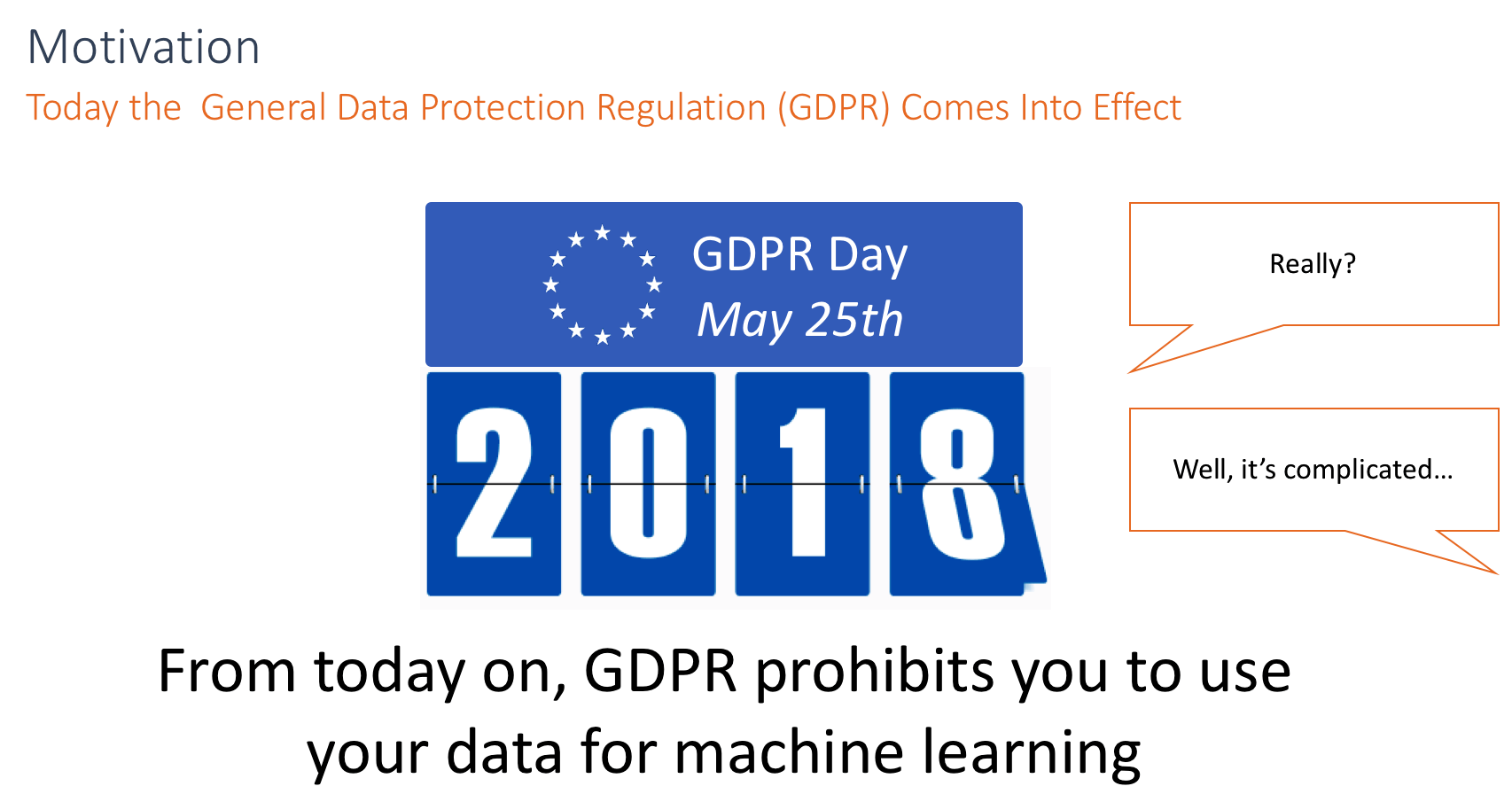
Additional Insights:
- One of the tangential benefits of GDPR is that it has led to breaking of “legacy glass” so data can be re-architected and ultimately leveraged more effectively for the Digital transformation.
- Hype surrounding artificial intelligence and machine learning continues to accelerate; many organisations can’t leverage these powerful new technologies because the data isn’t accessible.
- Regulations can help accelerate data accessibility and ultimately the use of AI.
- GDPR will cause providers of products and services to focus more on delivering value to the customer in exchange for access to data.
Showcase: Finding Digital Insights by Breaking Data Scalability and Cost Constraints by Colin Britton, Chief Strategy Officer at Devo and Fireside Chat with Sergio Sánchez Gallego at Telefónica
Given that “data is the new oil” and is core to Digital transformation, many large companies experience scalability challenges when it comes to ingesting data into traditional platforms like Splunk. Colin Britton made a few salient points:
- Platforms designed many years ago didn’t contemplate the explosion of data that we have experienced over the past two decades.
- Pricing models for these platforms provide serious constraints.
- Devo, based in Madrid, attempts to solve the frustration shared by IT operations, data analysts and business users: the more data a business collects, the more difficult and costly it is to extract insights quickly enough to influence business outcomes.
- For pennies on the dollar, Devo ingests any type of data, regardless of source - IT infrastructure, sensors, business applications, clickstream, IoT devices, network traffic, web servers, CRMs. Whether it's from the cloud, a partner, or from within your own infrastructure, Devo can collect data from it.
- Colin discussed how Telefonica is pushing all data from mobile devices, routers, cell towers, IPTVs, log files and other sources into Devo and has discovered several game changing revenue and efficiency use cases as a result.
Keynote: It’s Not About Rewriting Your Software, It’s About Rewriting Your Company by Anisha Vaswani, Vice President, Enterprise Systems at Box
Anisha Vaswani who runs Enterprise Systems at Box says, “It’s not about rewriting your software, but rewriting your company.” She spoke about companies such as Uber, Airbnb, and Netflix and observed that these are new business models first and foremost, and technology second. She showed an architectural diagram of the Uber platform and provided the insight that the vast majority of technology driving platform is off-the-shelf.
Showcase: Is Adoption Killing Your Digital Transformation? by Rafi Sweary, President at WalkMe
What is the future of software? This was the theme of Rafi Sweary’s presentation. He discussed how GoogleMaps transformed travel so that drivers today no longer need to know how to read maps or memorize driving instructions. Sweary, President at WalkMe, introduced the concept of the WalkMe Digital Adoption platform that provides internal and external users of Digital software a GoogleMap-like experience where the user no longer needs to be trained on software or remember how to use it. Users simply need to tell WalkMe what they would like to perform and WalkMe does the rest. Rafi also introduced the concept of “self-driving software” and shared that it’s now possible for WalkMe to automatically complete many steps in a business process making it even easier to use software.
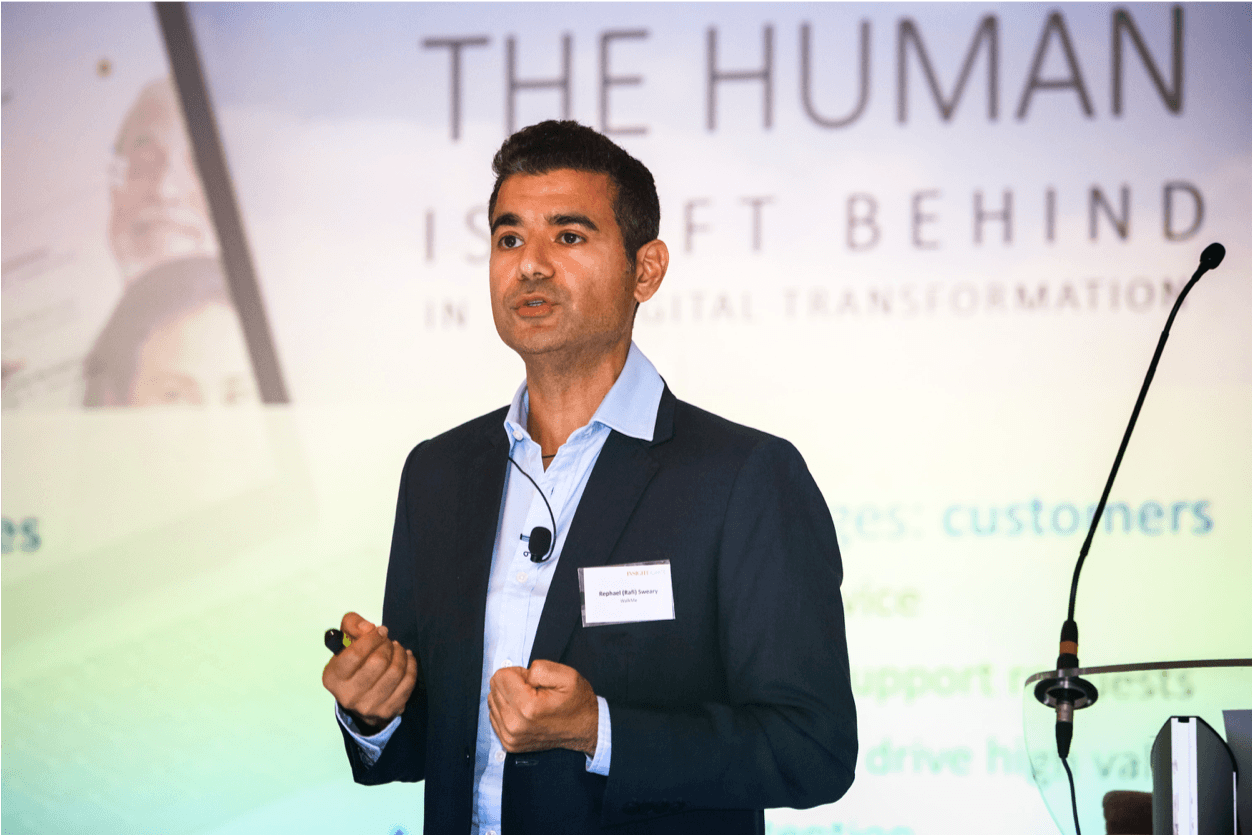
Keynote: Insights from our DevOps and Hybrid Cloud Investment Strategy by Thomas Krane, Vice President at Insight Venture Partners
Thomas Krane, Vice President at Insight Venture Partners shared the firm’s investment viewpoint on DevOps and the Hybrid Cloud, noting that we are still in the early days of the Digital software delivery transformation. The firm made several investments in the Cloud since 2015, including companies like Docker, Mirantis, Skytap, Veeam and others. More recently, the market has shifted focus to Cloud management and security, and Insight have made investment in various platforms including CoreView, CloudBolt, FireMon, Tenable, Tricentis and several others.
Innovation Showcase: Removing Manual Testing as a Barrier to Agility by Sandeep Johri, CEO at Tricentis & Fireside Chat with Clark Golestani, former President, Emerging Businesses and Global CIO at Merck
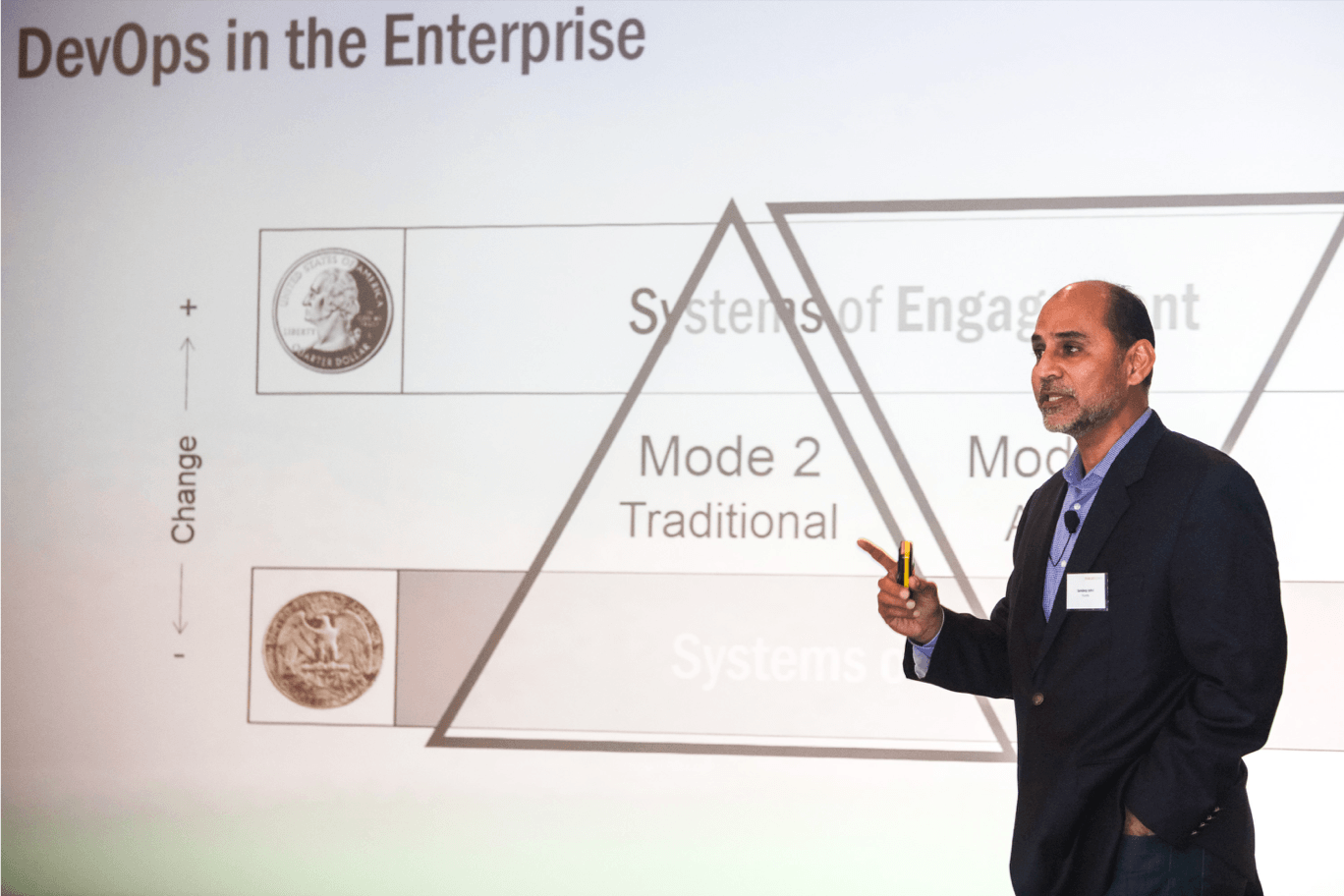
While many organisations have made progress on the adoption of the Agile development process and the public Cloud for deployment, traditional offshore manual testing has created a massive roadblock to organisational agility. Sandeep Johri, CEO of Tricentis, gave a keynote on the company’s platform, focused on how the people, process and technology surrounding traditional testing must be transformed in order to deliver agility.
Sandeep interviewed Clark Golestani, former Group CIO at Merck, who shared that he started losing A+ developers because they weren’t interested in working in a stifling environment brought about by the lack of agility caused by manual testing. When Clark realized what was happening, he personally sponsored their automated testing transformation which led to Merck unlocking agility across the organisation.
Keynote: Insights on AI/ML Investment Dynamics by Lonne Jaffe, Managing Director at Insight Venture Partners
Lonne Jaffe, Managing Director at Insight Venture Partners is the former CEO of Syncsort; he focuses on the firm’s AI/ML investment strategy.
Lonne shared that it’s early days in AI despite the hype and the following insights:
- AI has found a home in Cyber Security and, hence, Insight has made investments in organisations like Recorded Future, Cylance and Darktrace.
- When data is accessible, specific, viable use cases are emerging e,g, Insight’s recent investment in PrecisionLender, for pricing commercial loans at Financial Institutions and Sift Science for preventing consumer fraud.
- AI makes it possible for software to build software. It’s very powerful when a software platform is becomes smarter and smarter every day by accessing data.
Innovation Showcase: Leveraging Artificial Intelligence to Protect the Endpoint by Daniel Doimo, President and COO at Cylance
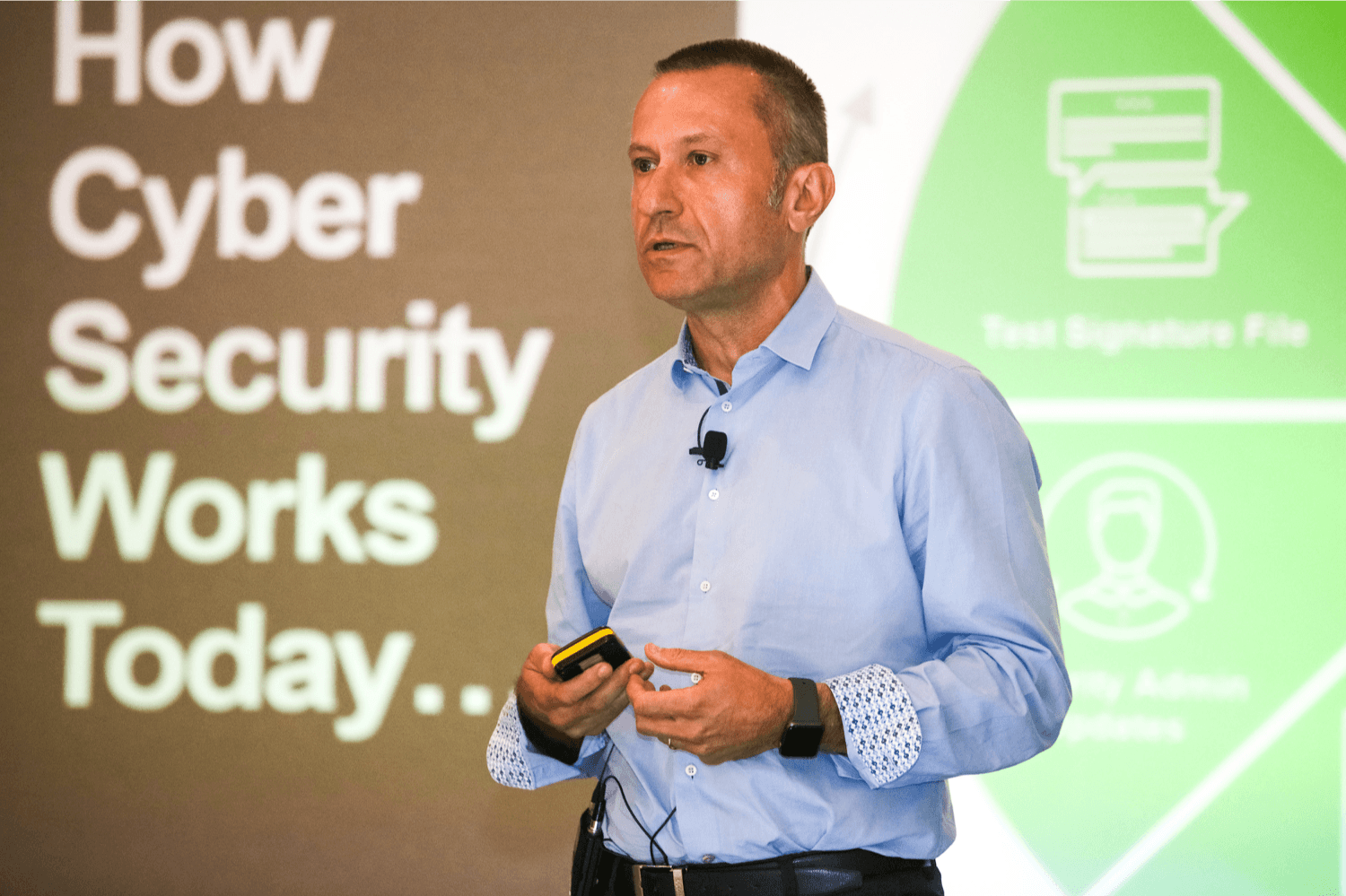
Daniel Doimo, President at Cylance, spoke about their platform which leverages AI to protect the end point in a game-changing way that is very different from traditional security providers (like Symantec and McAfee). He noted that many recent viruses have been devastating to large global companies, yet they would have all been discovered and blocked by Cylance, had AI been sitting on the end point. Cylance has discovered many of these ransomware attacks months or year before the ultimate outbreak. One executive in the room that took a multi-hundred million write-off as a result of WannaCry, shared that his organisation later learned that Cylance would have helped them to avoid the turmoil and expense related to this attack.
Fireside Chat: The Future of Formula 1 Digital with Frank Arthofer, Global Head of Digital and New Business at Formula 1
Formula 1 was recently acquired by Liberty Media for nearly $9B. Liberty’s vision is to take the sport through a Digital transformation, their thesis being that 500 million fans globally are starving to watch the races anytime, anywhere and on any device. This fanbase would prefer all racing content and commerce be consolidated onto a single Formula 1 Digital platform.
Emmet B Keeffe III, Founder, Insight IGNITE and Venture Partner, interviewed Frank Arthofer, the new Chief Digital Officer at Formula 1, about his vision to transform the sport. Frank spoke about how Liberty will put the fan at the centre of the sport and deliver these new products and services as quickly as possible. He believes:
- eSports will emerge as a massive new channel for Formula 1, making it possible for the world’s best gaming racing car drivers to compete real-time during race weekend with the real-life racing car drivers.
- The real-time merging of the physical and virtual world has never been possible in sports and will only be possible in Formula 1 because the cars are effectively IoT devices, loaded with sensors that transmit data in real-time.
- Frank’s team plans to “Unleash the Greatest Racing Spectacle on the Planet” and that racing will only be one element of the ultimate experience that fans can enjoy over the three-day race weekend.
Closing comments by Emmet B. Keeffe III, Founder, Insight IGNITE and Venture Partner at Insight Venture Partners
After two days of conversations and information exchange, it’s clear that legacy culture is the real barrier to Digital transformation. While new technologies are themselves complex, it’s the transformation of process -- the re-invention of business models and ultimately the cultural transformation – this is the difficult part. Monaco participants shared their best practices and tips for navigating cultural and digital transformation.
Please contact Insight IGNITE, to learn more about our Roundtable Series, and to suggest speakers who have a point of view on how to lead change in an age of Digital. ekeeffe@insightpartners.com






